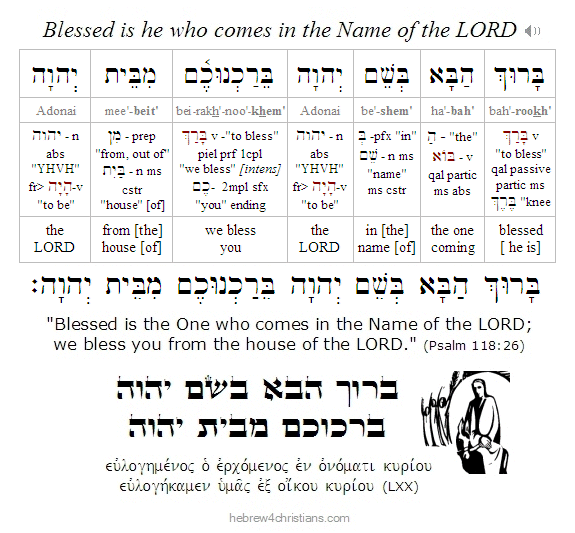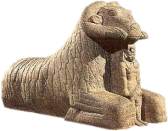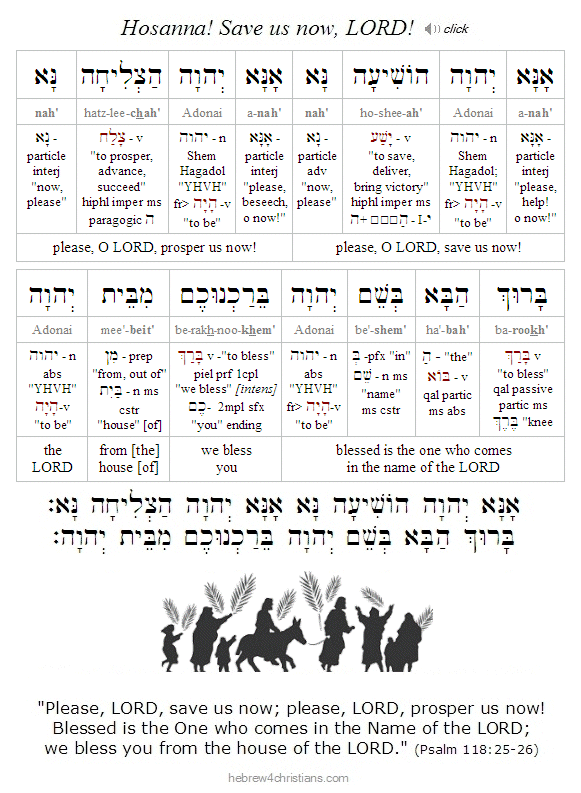|
Customs of Shabbat HaGadol
During the time of the Temple in Jerusalem, it was customary to obtain the Korban Pesach four days before Passover so that worshippers could make sure that their lambs had no blemishes which would preclude them from being offered as sacrifices. This was done to fulfill the instructions given in Exodus 12 that the lamb for Passover be "without spot or blemish." Interestingly, this period of time allowed time for each family to become personally attached to their lamb, so that it would no longer simply be "a lamb" (Exod. 12:3) but rather their lamb" (Exod. 12:5). Indeed the Torah refers to "the" Lamb of God, as if there was only one: "You shall keep it [i.e., the Passover lamb] until the fourteenth day of this month, when the whole assembly of the congregation of Israel shall slaughter him (ūÉū¬ūĢų╣) at twilight (Exod. 12:6). Note that the direct object "him" (i.e., oto) can be read as Aleph-Tav (ūÉū¬) combined with the letter Vav (ūĢ), signifying the Son of Man who is First and Last.
On the afternoon of the Nisan 14, at twilight, the lambs were to be publicly sacrificed by the "whole assembly." And even though the entire nation was responsible for the death of the lambs, each family was to apply the blood of their personal lamb upon the doorpost as a sign of their faith in the Lord (Exod. 12:7).
Post-Temple Rabbinical Traditions
After the Mashiach Yeshua came, the Temple was destroyed (AD 70) and Rabbinical Judasim assumed leadership of the Jewish people. The idea of sacrifice was changed to mean prayer and the performance of mitzvot. The rabbis then commemorated Shabbat HaGadol by ordaining that a special sermon be delivered on this day, usually from a Torah sage who would discuss some of the laws associated with Pesach. The sermon usually explained how utensils must be prepared for use on Passover, how to remove chametz, and the rules concerning the baking of matzot. On the day before Shabbat haGadol it was also customary to bake a small quantity of bread reserved for making matzot and give it to the poor.
In addition to the additional haftarah reading (see below), many communities also recite special hymns during the shacharit (morning) services on Shabbat haGadol. As a sort of "warm up" for Passover, it is also customary to recite part of the Passover Haggadah on Shabbat haGadol as a rehearsal for the coming Seder night.
The Triumphal Entry of Yeshua
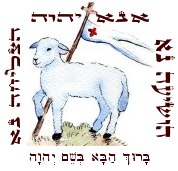
Jesus' last Passover began some time before the Festival actually began (see John 12:1-33). After visiting his friend Lazarus and his sisters in Bethany, He went to Jerusalem just before the city became filled with pilgrims coming to celebrate the holiday. On the 10th of Nisan He entered the city, riding on a donkey to announce His Messiahship (this was the time the korban Pesach was being selected for the sacrifice). Examined for four days before His sacrifice (execution) for the sins of the world, He was found to be the true Lamb of God (seh haElohim) without spot or blemish.
The Holy City would have been a busy place, bustling with excitement and (due to Roman oppression) filled with Messianic expectation. Countless Jews would have streamed in from around the world to observe the Passover with their extended families. The Law required (Ex. 12:1-6) that each family select a lamb (called korban Pesach) four days before the sacrifice was to be offered at the Temple. During this time the lamb would be examined to ensure that it was defect-free and therefore acceptable for sacrifice at the Temple.
Note that when Yeshua first entered the city, He was greeted by the cries of Jewish Passover pilgrims: "Hosanna!" This word is actually the phrase "hoshiah na" (ūöūĢų╣ū®ūüų┤ūÖūóųĖūö ūĀų╝ųĖūÉ), meaning "please save" or "save now." The Jewish pilgrims were singing Psalm 118:25-26 and applying it to the greater Son of David, Yeshua, who had come:
ūÉųĖūĀų╝ūÉ ūÖų░ūöūĢųĖūö ūöūĢų╣ū®ūüų┤ūÖūóųĖūö ūĀų╝ųĖūÉ
ūÉųĖūĀų╝ųĖūÉ ūÖų░ūöūĢųĖūö ūöųĘū”ų░ū£ų┤ūÖūŚųĖūö ūĀų╝ųĖūÉ
ūæų╝ųĖū©ūĢų╝ūÜų░ ūöųĘūæų╝ųĖūÉ ūæų╝ų░ū®ūüųĄūØ ūÖų░ūöūĢųĖūö
ūæų╝ųĄū©ųĘūøų░ūĀūĢų╝ūøųČūØ ū×ų┤ūæų╝ųĄūÖū¬ ūÖų░ūöūĢųĖūö

"Please, LORD save us! Please, LORD rescue us!
Blessed is He who comes in the Name of the LORD
We bless you from the house of the LORD."
(Psalm 118:25-26)
Hebrew Study Card
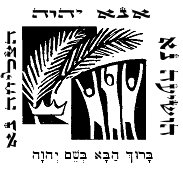
Hebrew Lesson
Psalm 118:25-26 Reading (click for audio):
Matthew notes that hoshiah nah was addressed to Yeshua Himself, "to the son of David" (ū£ų░ūæųČū¤ųŠūōų╝ųĖūĢų┤ūō), thereby indicating that the Messianic Hope was presented to Israel (Matt. 21:9). For a flickering moment the proper praise was given to Yeshua as Mashiach ben David, though of course He had come to them as Mashiach ben Yosef, their Suffering Servant, the One to whom the prophet Isaiah clearly foretold.
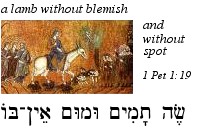
Upon entering Jerusalem, Yeshua immediately went to the Temple and drove out all who sold there, overturning the tables of the "moneychangers" and the seats of those who sold pigeons (Matt. 21:12). There were actually TWO separate cleansings of the Temple recorded in the New Testament. The earlier cleansing is described in John 2:13-22 and the later one is described in (both) Mark 11:15-19 and Matthew 21:1-16. In Mark's account of the second cleansing, Yeshua actually stopped the "carrying of the ritual vessels" -- meaning He LITERALLY stopped the sacrifices of Israel. Mark 11:16 states: "And he would not suffer that any man should carry any vessel through the Temple." Despite performing miraculous works of healing in the Temple that day -- including opening the eyes of the blind and causing the disabled to walk -- the kohanim (chief priests) and soferim (scribes) were "indignant" at His actions and therefore sought to put Him to death (Mark 11:18).
In the evening Yeshua left the Temple for Bethany (ūæųĄų╝ūÖū¬ ūóųĘūĀų░ūÖųĖūöŌĆÄ), the home town of Mary, Martha and Lazarus, where He stayed the night. The following morning He walked back to Jerusalem, and being hungry, saw a fig tree along the way. When He saw that the fig tree was without any fruit, Yeshua pronounced these words: "May no fruit ever come from you again!" And the fig tree withered at once (Matt. 21:18-19).
Over the next two days, Yeshua was accosted by various priests, scribes, Pharisees, etc. -- the whole religious establishment -- which culminated in His denunciation of them beginning in Matthew 23. He then laments over Jerusalem and retreats from the Temple with these words:
"O Jerusalem, Jerusalem, the city that kills the prophets and stones those who are sent to it! How often would I have gathered your children together as a hen gathers her brood under her wings, and you would not! See, your house is left to you desolate. For I tell you, you will not see me again, until you say, 'Blessed is he who comes in the name of the Lord.'" And Jesus went out, and departed from the Temple (Matt. 23:37-24:1).
In Matthew 24 Yeshua's disciples made a last-ditch appeal for Jewish tradition and ceremony by pointing out the glory of the Second Temple. "Look at these beautiful buildings of the Temple, Lord..." It was then that Yeshua pronounced judgment on the Temple and the entire Levitical sacrificial system, predicted the destruction of the Temple by Rome, and so on. This was apparently unfathomable to the disciples, who apparently still considered Yeshua to be a "reformer" of Temple Judaism, perhaps the one who would restore it so that the Kingdom of God would be finally manifest upon the earth. Yeshua went on to explain the signs of the End of the Age (ūÉųĘūŚų▓ū©ų┤ūÖū¬ ūöųĘūÖų╝ųĖū×ų┤ūÖūØ) that would precede the promised Days of Messiah (ūÖų░ū×ųĄūÖ ūöųĘū×ų╝ųĖū®ūüų┤ūÖūŚųĘ), otherwise known as the Messianic Kingdom. He foretold that one day praise would rightly be given to Him as Israel's True King, but only after the travail of the coming Great Tribulation upon the earth. Only after the Jewish people cry out to Him as their LORD (Matt. 23:39) would the Kingdom of God be established in Zion.
Over the course of these days Yeshua was thoroughly "inspected" by the kohanim but was found to be tam (ū¬ų╝ųĖūØ) - without spot or blemish. During His early Passover Seder with His disciples, Yeshua foresaw His imminent sacrifice and associated the matzah with His body and the Cup of Redemption with His shed blood (Matt. 26:26-29). The New Covenant was going to be "cut" in the Person and Sacrifice of Yeshua... Later that same night, Judas betrayed Him and Yeshua was arrested at Gethsamane (ūÆų╝ųĘū¬ųŠū®ūüų░ū×ųĄūĀųĖūö). An illegal convention of the Sanhedrin was called. Yeshua was falsely accused, abused, and the following morning sentenced to die. He was bound and taken to Pontius Pilate who, though he found no fault in Him, spinelessly complied with agitated the crowd that called for His crucifixion (Matt. 27:11-31). There is no Passover apart from the sacrifice of the Lamb...
Yeshua was crucified (before sundown) on Nisan 14, prophetically corresponding with the time when the Passover lambs were sacrificed at the Temple. He was on the cross for six (Jewish) hours (see note below). He was nailed to the cross at 9:00 a.m in the morning and was dead by 3:00 p.m. Darkness was over the land for the last three hours Yeshua was on the Cross (Matt. 27:45). His body was removed before sunset, just before Passover began, in accordance with Jewish law.
A Note about the Jewish Hour (sha'ah)
In rabbinical thinking, the hour is calculated by taking the total time of daylight (from sunrise until sunset) of a particular day and dividing it into 12 equal parts. This is called sha'ah zemanit, or a "proportional hour."
Since the duration of daylight varies according to seasons of the year, a proportionate hour will therefore vary by season. The "sixth hour of the day" does not mean 6:00 a.m. or even six 60 minute hours after sunrise, but is the 6th proportionate hour of the 12 that are counted for the day in question.
For example, if the sun rises at 4:30 a.m. and sets at 7:30 p.m., the total time of daylight is 15 hours. 15 hours * 60 minutes is 900, which divided by 12 yields a proportional hour of 75 minutes. The "sixth hour of the day" therefore begins 450 minutes after sunrise, or about 11:30 in the morning.
The calculation of these zemanim ("times") are important for the observance of Jewish holidays and Sabbath candle lighting hours. The results will vary depending on the length of the daylight hours in the particular location.
The Cross of Yeshua is the true Holy of Holies where God Himself offered His Son as the Lamb of God who takes away the sins of the world... It is there that He made agonizing intercession for us -- the Just for the unjust -- so that we are spared from God's wrath and eternally reconciled to Him. Just as the original Passover foreshadowed God's deliverance of His people from Egypt and slavery, so the Passover of Yeshua represents God's deliverance of us all from the power and slavery to sin.
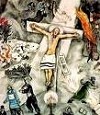
Yeshua had foretold that one day the praise will be rightly given to Him as Israel's true King, but only after the travail of the coming Great Tribulation upon the earth, when the Jewish people will cry out to Him and all Israel shall be saved (Matt. 23:39). However, through His propitiatory death -- the Just for the unjust -- and our faith in His love for us, we are ascribed righteous standing before God Himself (2 Cor. 5:21). During this Passover season, let us all join the chorus and say, "Blessed is He (Yeshua) who comes in the Name of the LORD!" (ūæų╝ųĖū©ūĢų╝ūÜų░ ūöųĘūæų╝ųĖūÉ ūæų╝ų░ū®ūüųĄūØ ūÖų░ūöūĢųĖūö). Amen.
Like the original Passover in Egypt, the sacrifice of the Lamb causes the wrath of God to "pass over" those who are trusting in the LORD's provision for redemption, but in the case of the sacrifice of the Mashiach Yeshua, the everlasting Son of God, this redemption delivers us from the cruel bondage of Satan and causes the everlasting wrath of God to forever be put away from us. Indeed, Jesus is the Lamb of God who takes away the sins of the world!
Corresponding to the LORD's commandment to select lambs fit for korban Pesach (Exod. 12:1-6), for four days Yeshua was "inspected" by the kohanim (as well as the Roman Pontius Pilate) -- yet was found to be tam (ū¬ų╝ųĖūØ) - without spot or blemish. Nonetheless was He unjustly sentenced to die and later was crucified (before sundown) on Nisan 14, prophetically corresponding with the time when the Passover lambs were sacrificed at the Temple. The Cross of Yeshua is the true Holy of Holies where God Himself offered His Son as the Lamb of God who takes away the sins of the world...
Future Fulfillment: The Day of the LORD
In addition to the regular Torah and Haftarah readings for Shabbat, an additional haftarah reading (Malachi 3:4-24h) is recited for Shabbat HaGadol. In this reading, Malachi speaks of another day of redemption in the future. Therefore the Talmud teaches:
Rabbi Yehoshua says: "In Nissan the world was created ... the bondage of our ancestors ceased in Egypt; and in Nissan they will be redeemed in time to come." (Talmud Rosh HaShana 11a)
The prophetic reading ends with:
ūöų┤ūĀų╝ųĄūö ūÉųĖūĀūøų┤ūÖ ū®ūüū£ųĄūŚųĘ ū£ųĖūøųČūØ ūÉųĄū¬ ūÉųĄū£ų┤ūÖų╝ųĖūö ūöųĘūĀų╝ųĖūæų┤ūÖūÉ
ū£ų┤ūżų░ūĀųĄūÖ ūæų╝ūĢų╣ūÉ ūÖūĢų╣ūØ ūÖų░ūöūĢųĖūö ūöųĘūÆų╝ųĖūōūĢų╣ū£ ūĢų░ūöųĘūĀų╝ūĢų╣ū©ųĖūÉ
hin┬Ęnei ┬Ę a┬Ęno┬Ękhee ┬Ę sho┬Ęle'┬Ęach ┬Ę la┬Ękhem ┬Ę et ┬Ę E┬Ęlee┬Ęyah ┬Ę ha┬Ęna┬Ęvee
leef┬Ęnei ┬Ę bo ┬Ę yohm ┬Ę Adonai ┬Ę ha┬Ęga┬Ędohl ┬Ę ve┬Ęha┬Ęno┬Ęra

"Behold I will send you Elijah the prophet
before the great and awesome day of the LORD comes."
(Mal. 3:23)
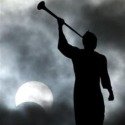
|
![Spring Holiday Timeline (H4C]](../../../../Holidays/Spring_Holidays/Shabbat_HaGadol/shabbathagaolline.gif)
